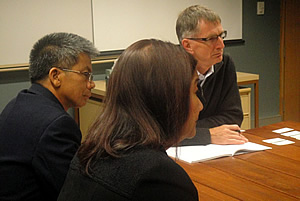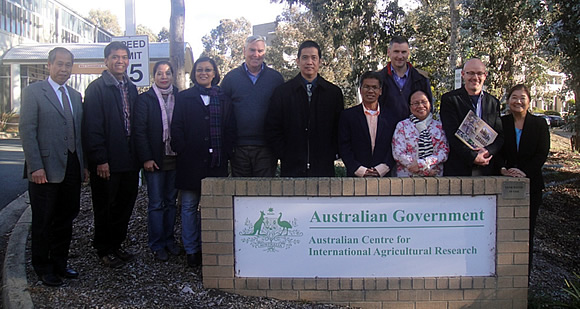The PCC, an attached agency of the Philippines Department of Agriculture, is mandated to conserve, propagate, and promote the carabao or native buffalo as a source of milk and meat as well as draft animal power and hide to benefit the rural farmers.
Participants visited relevant institutions in Armidale, Sydney, and Canberra, as follows:
- The Agricultural Business Research Institute (ABRI), a company based at the University of New England (UNE) in Armidale, which specializes in the provision of a wide range of agribusiness information services to the domestic and international livestock industries. ABRI commercialized the BREEDPLAN, the world’s most widely used genetic evaluation for beef cattle used by 44 breeds and more than 100 breed associations across 15 countries;
- Dairy Express Herd Recording Service, which provides Management Information Systems for the Dairy Industry (MISDI) of Australia;
- School of Environmental and Rural Science of UNE, which provides students with skills to monitor the health of a wide variety of ecosystems, and understand the science of agriculture, food production, sustainability, geology and environmental engineering. Research activities in the School focus along three themes: Animal Science and Systems, Earth and Life Systems, and Plant, Soil, and Environment Systems.
- Meat and Livestock Australia (MLA) in Sydney, a producer-owned company providing marketing and research and development services to over 48,000 cattle, sheep, and goat producers. MLA creates opportunities for livestock supply chains from their combined investments to build demand and productivity;
- The Australian Centre for International Agricultural Research (ACIAR) in Canberra, a statutory authority within the Foreign Affairs and Trade portfolio operating under the ACIAR Act. ACIAR’s mandate is to plan, fund, and manage projects across a broad range of agricultural and development areas;
- Rural Industries Research and Development Corporation (RIRDC), a statutory authority established by the Primary Industries and Energy Research and Development Act 1989 (PIERD Act) established by the Australian government to work with industry to invest in research and development that assists rural industries to be more productive, profitable, and sustainable; and
- Department of Agriculture in Canberra, which was established by the Australian government to lead the development of policy advice and provide services to improve the productivity, competitiveness and sustainability of agriculture, fisheries, forestry and related industries.

During these visits, the participants gained a wider perspective of how the industry livestock system in Australia, especially its research and development and extension (RDE) components, operate and how public-private partnerships work for the economic development of smallholder farmers. Some of the best practices in terms of livestock development and management may be contextualized to suit the Philippine livestock smallholder setting, such as the cooperative research center.
The PCC officials were composed of Dr. Arnel N. del Barrio, PCC’s newly appointed Executive Director; Dr. Liza G. Battad, Chief, Planning and Special Projects; Dr. Annabelle S. Sarabia, Chief of Operations; Dr. Eric Palacpac, Chief of Knowledge Resource Management and R&D Coordinator; Dr. Claro N. Mingala, Scientist and Lead Researcher for Animal Health; Dr. Ester B. Flores, Project Development Officer IV; and Dr. Libertado C. Cruz, Technical Adviser. Ms. Nova A. Ramos, SEARCA Program Specialist, served as study mission coordinator. (Nova A. Ramos)